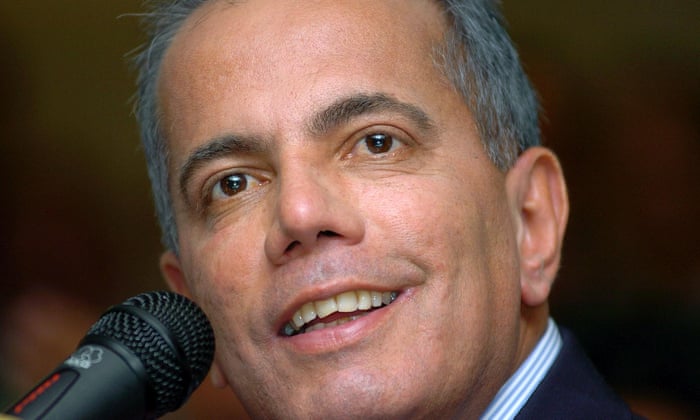Venezuela frees politician and student activists jailed during 2014 protests
Releases of former opposition candidate Manuel Rosales and five other activists come amid talks over country’s economic and political crisis

Manuel Rosales, seen here in 2006, was released from prison before dawn on Saturday. Photograph: Gregorio Marrero/AP
Venezuela’s government has freed a former presidential candidate as well as several student activists who were jailed during anti-government protests in 2014.
Former opposition candidate Manuel Rosales was imprisoned in October 2015 on charges of illicit enrichment, upon returning to Venezuela after six years of exile in Peru.
A former governor of Zulia state who ran for president in 2006, he was released before dawn on Saturday with five other activists who opposition groups considered to be political prisoners.
The releases came as a two-month-old, Vatican-mediated attempt at dialogue to ease tensions stemming from the country’s deep economic and political crisishung by a thread, over the failure by President Nicolás Maduro to cede ground to opponents seeking his removal.
With many in the opposition pushing for a new round of street protests, the Democratic Unity alliance said it would not participate in the next scheduled meeting on 13 January unless the government meets its demands.
Those include releasing more than 100 people it considers to be political prisoners and naming a new board to the government-controlled electoral council.
The most prominent activist released Saturday was Gerardo Carrero, who led a group of hardliner students who camped for weeks outside the United Nations offices in Caracas, seeking to draw attention to a government crackdown on protests blamed for scores of deaths.
“Without a doubt, Venezuela is living a deep social crisis and these releases in some way are an escape valve that takes some pressure, especially international, off Maduro,” said Alfredo Romero, executive director of Foro Penal, a group of lawyers that defends dozens of jailed activists.
“But it’s important to remember that in 2016 there were 55 people jailed and only 43 released.”
Venezuela’s political crisis has been intensifying since October, when authorities blocked an opposition effort to collect signatures and force a recall vote against Maduro.
Many poor Venezuelans, who formed the base of the revolution started by the late Hugo Chávez, have abandoned their support for the government amid triple-digit inflation and shortages that have made putting food on the dinner table an all-consuming, daily ordeal.
Rosales, whose small Nuevo Tiempo party has been among the strongest advocates of dialogue, confirmed his release on Twitter. He remained under house arrest.
The five others released face charges stemming from their activities in 2014, for which they will have to periodically present themselves to judicial authorities.
All six prisoners had been held in Caracas’ El Helicoide prison, a spiral-shaped modernist landmark built as a shopping mall in the 1950s, at the height of an oil-dependent economic boom, but which in a fitting metaphor of the country’s decline is now the headquarters of the intelligence police.
It was unclear if there would be more releases in the coming days, but Romero said at least one more activist was linked to the same case for which Carrero was charged.

